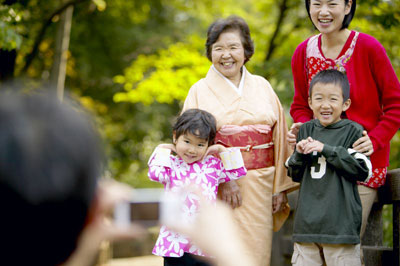(单词翻译:单击)
情景对话
Todd: Miki, where did you go to university?
托德:美琪,你在哪儿上的大学?
Miki: I went to university in California, at a school called the University of California at Berkeley.
美琪:我在加利福尼亚上的大学,我上的是加州大学伯克利分校。
Todd: And where is that in California?
托德:那所学校位于加州的什么地方?
Miki: It's in the Bay Area, which is in the northern half of California, right across the bay from San Francisco.
美琪:学校在海湾地区,位于北加州,就在旧金山海湾。
Todd: OK, and what did you study?
托德:好,那你学了什么?
Miki: I studied many things, but I majored in Japanese.
美琪:我学了很多,不过我的专业是日语。
Todd: Oh, really!
托德:哦,真的吗?
Miki: I did.
美琪:没错。
Todd: Oh, wow. Now you are of Japanese ancestry.
托德:哇!你有日本血统。
Miki: My mother is. My father is from Kansas.
美琪:我妈妈是日本人。我父亲来自堪萨斯。
Todd: Oh, really.
托德:真的啊。
Miki: His family is from the South, Kansas, Arkansas, Texas. My mother is from Japan. She grew up in Nagasaki and moved to Yokohama when she was young so most of my family is there, Yokohama and the South.
美琪:他的家人来自南部地区,堪萨斯州、阿肯色州和得克萨斯州。我母亲来自日本。她在长崎长大,年轻时搬去了横滨,所以我的大部分家人都在横滨和美国南部。
Todd: Oh, wow! What a combo.
托德:哇!这组合真棒。
Miki: Yeah, I guess so.
美琪:嗯,我也这么想。
Todd: Now were you already fluent in Japanese before you started university?
托德:那你上大学前就能说流利的日语吗?
Miki: I was but it wasn't a standard Japanese. It was very familial. It was Japanese that was spoken within the family, between parent and child, and so it was very casual, and conversational.
美琪:可以,不过并不是标准日语。那只是家庭用语,我说的是家人之间说的日语,是父母和孩子之间的用语,是非正式的用语,非常口语化。
Todd: OK. Is it difficult for you to comprehend people sometimes in Japan or is it just like home?
托德:好。你理解日本人说的话很难吗,还是你觉得就跟在家一样?
Miki: Oh, it's absolutely difficult because there, well first of all, they're dialects and then of course there are different levels of politeness and conversationalist, I guess, and especially once I get into a classroom with other professors, and other students, colleagues my age, it's quite difficult to follow the language, but if it's street talk it's much easier.
美琪:非常难,因为,首先,他们会说方言,而且敬语有不同的等级,和谈话专家……尤其是有一次我和其他教授、以及学生们以及和我同龄的同事一起进入教室,我很难理解他们说的话,不过要是街头闲谈就要容易多了。
Todd: Oh, really! OK, so at university, did you study just to learn Japanese as a language or did you study literature?
托德:真的啊。那你在大学的时候,是只把日语当作一门语言来学习,还是你也学习文学?
Miki: I'll be honest. I studied to get an easy degree, and frankly it was quite easy, but then I had a very good professor in classical Japanese and that's when my interest in literature and history actually was born and I ended up becoming a researcher in medieval history, medieval literature.
美琪:说实话,我学习的东西很容易获得学位,实话实说,我学的东西非常简单,不过之后我在学习古典日语的时候遇到了一位非常好的教授,正是那时我开始对文学和历史感兴趣,最终我成为了中世纪史和中世纪文学的研究员。
Todd: Wow, that must be really difficult though cause that's old, old style of language, it's an old text. (Yes) Like Shakespeare is difficult for me.
托德:哇,那一定非常难,因为那是语言的古典体,是旧体文字。(没错)就像我觉得莎士比亚很难理解。
Miki: That's actual, well, that's actually an interesting comparison cause Shakespeare is actually just a little bit easier for us modern Americans to comprehend than classical Japanese is for a modern Japanese person to comprehend because the language, actually, Shakespearean English is actually much closer to modern English than classical Japanese is to modern Japanese, but
it's not spoken, so if one has a dictionary, then one can do research.
美琪:那真是……那真是很有意思的比较,因为实际上我们现代美国人理解莎士比亚要比现代日本人理解古典日语要容易,因为实际上,莎士比亚风格的英语和现代英语很相似,可是古典日语离现代日本人就比较久远了,不过那并不是口语,所以如果你有字典,那你就能进行研究。
Todd: Alright! Well, thanks a lot Miki.
托德:没错!好,美琪,非常感谢你。
Miki: You're welcome.
美琪:不客气。

重点讲解
重点讲解:
1. grow up
长大成人;
eg. The children are then more likely to grow up bright and intelligent.
这样孩子们长大后才有可能变得聪明智慧。
eg. Many young rock hounds grow up to be geologists.
许许多多爱好收集岩石的少年,长大后成了地质学家。
2. first of all
首先;第一;
eg. First of all, you should know what profession suits you.
首先,你该知道什么职业适合你。
eg. First of all, to try to keep calm at the interview.
首先,面试时要保持镇静。
3. end up (in) sth./doing sth.
最终;结果;到头来;
eg. Don't loaf away your time, or you'll end up in failure.
别消磨时光,否则你最终会失败的。
eg. They end up accepting the unacceptable.
他们最终接受了无法接受的条件。


